| Release List | Reviews | Price Search | Shop | Newsletter | Forum | DVD Giveaways | Blu-Ray/ HD DVD | Advertise |
| Reviews & Columns |
|
Reviews DVD TV on DVD Blu-ray International DVDs Theatrical Reviews by Studio Video Games Features Collector Series DVDs Easter Egg Database Interviews DVD Talk TV DVD Talk Radio Feature Articles Columns Anime Talk DVD Savant HD Talk Horror DVDs Silent DVD
|
DVD Talk Forum |
|
|
| Resources |
|
DVD Price Search Customer Service #'s RCE Info Links |
|
Columns
|
 |
Frank Sinatra: |
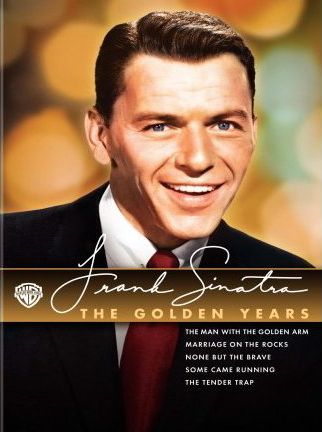
|
Frank Sinatra: The Golden Years The Tender Trap, The Man with the Golden Arm, Some Came Running, None but the Brave, Marriage on the Rocks Warner DVD 1955-66 / B&W & Color / Street Date May 13, 2008 / 39.98 Starring Frank Sinatra Directed by Charles Walters, Otto Preminger, Vincente Minnelli, Frank Sinatra, Jack Donohue |
Want to see what Frank Sinatra's major star attraction was all about? The most prestigious of the four boxed sets being given a simultaneous release by Warners is Frank Sinatra: The Golden Years. The mix boasts two of Sinatra's better dramas and one of his best comedies, as well as one dated misfire and an odd war film that he directed himself. We can see 'Ol' Blue Eyes' at the top of his form, and then on cruise control a decade later, when he was an overbooked champion of recordings, movies and live performances. All of the films are new to DVD, if one counts this fully-authorized release of The Man with the Golden Arm.
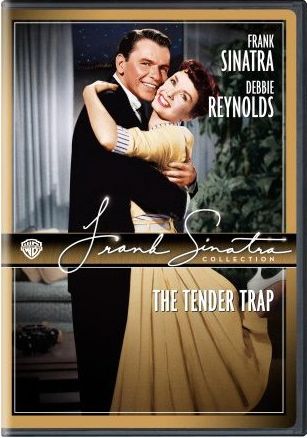
The glossy romantic comedy The Tender Trap is a perfect fit for MGM of 1955, a quantum improvement on his (mostly) disposable musicals of a few years before. Adapted only slightly from Max Shulman and Robert Paul Smith's very funny play, the majority of the action takes place in one New York bachelor apartment. Sinatra proves himself a natural for the role of a Manhattan playboy brought to heel by a girl with marriage on her mind. The emphasis on the female imperative differentiates this farce from Sinatra's later Rat Pack pix: Sinatra's swinger is really a sentimentalist ripe for the picking.
Julius J. Epstein's screenplay gives theatrical agent Charlie Reader (Sinatra) more beautiful dames than he knows what to do with. They volunteer to clean his house and walk his dog, pretty much catering to his every whim. Charlie has a somewhat steady girl in Sylvia Crewes (Celeste Holm) but she's beginning to think that no power on earth will win her a proposal. Visiting from Cleveland is Charlie's college buddy Joe McCall (David Wayne), who marvels at his host's luck with women while thinking of straying from his wife and three children back home. But the real catalyst is Julie Gillis (Debbie Reynolds), a young dramatic hopeful with an ironclad agenda for a husband and three kids, all on a pre-planned timetable. Reynolds played a main role in Max Shulman's original film version of The Affairs of Dobie Gillis (note the name connection). The most forceful character in the later Dobie Gillis TV show was Zelda Gilroy, a husband-hungry co-ed who is essentially Julie Gillis pushed to a further extreme.
The Tender Trap states the 1950s mindset on matrimony right up front. While Charlie and Sylvia listen in amazement, the determined Julie declares that a woman isn't a woman until she's married and has children. Julie refuses to sign a full-term theatrical contract because she has a hard retirement date in mind just four months away ... even though there's no sign of a fiancée on her horizon. Charlie is fascinated, when he should be running for the exit. The female barracuda assumes they're engaged as soon as Charlie tries to get cozy: (Julie: "That's not necking, that's nibbling!"). Sinatra revolts for one night but knows he's hooked, despite the fact that he's asked Sylvia to marry him in the interim. The script keeps four pleasant characters (well, three and one 'sweet' barracuda) supplied with warm and witty dialogue. Once one accepts Julie's notion that the wedding altar is the rightful destination of all noble human endeavor, The Tender Trap is very amusing. Debbie Reynolds has sharp teeth, David Wayne is pleasantly confused and Celeste Holm is both insightful and lovable, negating the handicap of the 'thankless role'.
As the playboy with four too many girlfriends, Sinatra is certainly up to snuff. It was a busy film year for him, considering that 1955 saw the release of this picture, Guys and Dolls and the next movie in this collection, The Man with the Golden Arm. The New York agent racket looks like good work, as Charlie spends most of his days getting up at noon and lounging on the sofa with a selection of hot numbers. Jarma Lewis, Lola Albright and a captivating Carolyn Jones are Charlie's to-die-for girlfriends. Sylvia meets Tom Helmore (Vertigo) in an elevator and a young James Drury has a bit as Charlie's assistant.
Turner's enhanced transfer of The Tender Trap has bright colors and the sharpness necessary to register facial expressions in the many wide master shots. The opening and closing renditions of Sammy Cahn and Jimmy Van Heusen's hit title song appear to be filmed in front of the painted sky backdrop of MGM's water tank, used for ocean-going scenes and miniature shoots. Sinatra walks up and over the concrete weir that serves as an invisible ocean horizon when the tank is filled with water. The smooth featurette Frank in the Fifties covers Sinatra's transition from 40s musical sensation, to a self-assured superstar reasserting his own personality.
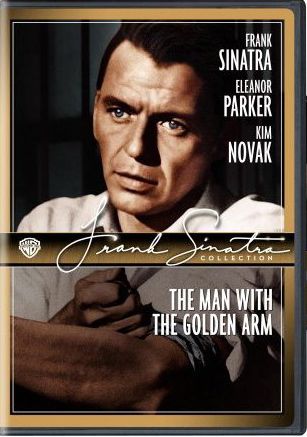
The Man with the Golden Arm is a smart career move for Sinatra, a show with a much more challenging role than his Oscar-winner From Here to Eternity. The first Hollywood movie to examine drug addiction at close quarters, the film was one of the first to successfully challenge the Production Code. Producer-director Otto Preminger turned the resulting controversy into a brilliant publicity tool, boosting his box office receipts.
Sinatra is Frankie Machine, a recovered addict who returns to Skid Row with a plan to escape poverty. He's learned to play the drums in the prison hospital and has an agent willing to send him on auditions. Unfortunately, Frankie can't escape the mire of his previous associations. A crooked gambling promoter (Robert Strauss) and a pusher (Darren McGavin) want Frankie compromised by dope as a way of forcing him to deal cards for their illegal poker games. Frankie's crippled wife Zosch (Eleanor Parker) wants him to forget drumming so that he'll spend all his time with her. When the pressure builds Frankie gets hooked again. Only Molly, the loving girl downstairs (Kim Novak) seems to be on Frankie's side.
The Man with the Golden Arm is emotionally authentic despite its overall artificial quality. A somewhat fake city street set, the bland B&W lighting and the too-glamorous Novak prevent the movie from expressing the squalor and misery of life at the bottom. Preminger wanted to break the Production Code but had no intention of rendering Nelson Algren's novel at full force. But Sinatra's convincing performance is enough to overpower the film's compromised ending, providing at least a hope for Frankie Machine's future.
The Man with the Golden Arm is remembered more for its effect on Hollywood censorship than for its own considerable merits. Warner Home Video's disc appears to be the film's first really satisfactory DVD presentation. Several flat versions have been released; this edition appears to reference original materials and restores the film to its correct matted widescreen screen shape. The tighter framing enhances the performances and Saul Bass' famous main title sequence.
A making-of featurette Shoot Up / Shoot Out covers the The Man with the Golden Arm controversy with a nervous, graphic-heavy style. Biographer Foster Hirsch participates in the interviews, adding a number of important observations. An original trailer is included as well.
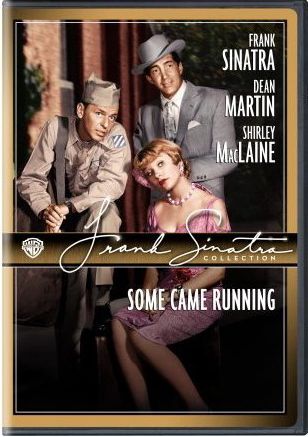
Some Came Running is a hard-hitting drama based on James Jones' follow-up novel to From Here to Eternity. Ex- GI Dave Hirsh (Sinatra) returns to his hometown after seventeen years, much to the distress of his brother Frank (Arthur Kennedy), now a prominent local citizen. As Dave was once a promising writer, Frank introduces him to Gwen French (Martha Hyer), a local college teacher. Gwen is fascinated by Dave's talent and repulsed by his sordid associations. Dave partners with gambler Bama Dillard (Dean Martin) and hangs out with Ginnie Moorehead (Shirley MacLaine), a pitiful bargirl who has followed him from Chicago. Marked as a black sheep, Dave helps his niece Dawn when she runs away from home. Unwilling to conform to his brother's notions of civility, Dave alienates his relations, confuses the women in his life, and enrages Ginnie's jealous boyfriend.
Some Came Running is an uneven but highly entertaining show. The lurid details occasionally verge on the risible, as when the middle-aged Frank Hirsh chooses the local lover's lane to conduct his illicit affair with his secretary Edith (Nancy Gates). The �intellectual� Gwen French character is typed as frigid and intolerant for rejecting Dave without a proper hearing. Sinatra's thoughtful performance holds the film together even when Minnelli employs lame devices, like establishing Dave Hirsh's literary credentials with a close-up of the 'quality' books he carries in his soldier's bag. The slightly cynical Dave forms interesting relationships with Dean Martin's superstitious, misogynistic gambler and Shirley MacLaine's awkward but adorable tramp. Dave's casual mistreatment of Ginnie ends when he undergoes a sudden change of heart, moving the film to a sentimental finish.
Director Minnelli earned plenty of attention with his staging of the film's violent conclusion, a bravura sequence set in a carnival at night. Extreme color stylization and a nervous moving camera jar the movie from its relative calm, and are reinforced by Elmer Bernstein's growling, dynamic music. Minnelli's designs work best on a big screen, where the first blast of wall-to-wall crimson serves notice that something terrible is about to happen. By this time Sinatra had learned to use his star clout and insisted that Dave and Ginnie swap places for the final scenes. What star wants to let a supporting actor walk away with the film's final, teary-eyed close-ups?
Some Came Running looks very good on in a sharp enhanced transfer with clean colors. The CinemaScope frame doesn't seem quite as wide as it should; the image may have been enlarged slightly to magnify the many scenes that hold on unbroken wide shots of entire rooms.
The extras begin with an original trailer that emphasizes the James Jones / From Here to Eternity connection. A making-of featurette is something of a debacle, with the good input of authors and academics buried under glitzy, irritating graphic eye candy. It feels like an audition reel for a graphics artist.
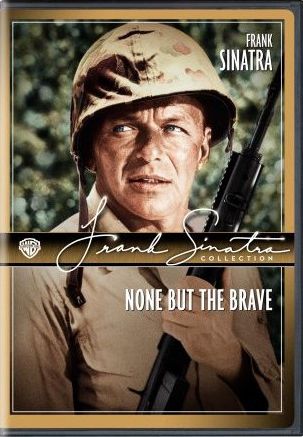
The two newest features on the Sinatra Golden Years box come from 1965, and are far from his best work. The actor also directs None but the Brave, a Japanese co-production that begins from a fairly progressive idea but is embarrassing in almost every respect. A planeload of U.S. Marines is marooned without a radio, on an island where a small garrison of Japanese soldiers has been similarly abandoned by their own retreating army. Since neither group is in a position to overwhelm the other they establish a temporary truce, only to see it interrupted by skirmishes, medical emergencies, etc. While waiting for rescue, the leader of the Japanese (Tatsuya Mihashi) exchanges philosophies with a cynical American medic (Sinatra). This 'show both sides' idea is now a war-movie requirement, as seen in Clint Eastwood's recent Letters from Iwo Jima. Sinatra's movie preceded equal emphasis war sagas like Beach Red and Hell in the Pacific.
Unfortunately, None but the Brave isn't as good as any of those pictures. Sinatra directs as if he's too lazy to move the camera, and he can't be bothered to put together a coherent action scene. Most dramatic setups simply spread the actors across the screen, producing the effect of a cold rehearsal. The lumpy ensemble never gels. Ranking officer Clint Walker comes off reasonably well but Tommy Sands' gung-ho lieutenant is grossly overplayed and almost sinks the picture on its own. Actors Rafer Johnson, young Tony Bill and frequent Sinatra associate Brad Dexter have little to do.
The Japanese troops are equally stereotyped. Mihashi's 'sensitive' commanding officer tries to dial down the brutality of his head sergeant, while a lovable ex-priest foot-soldier comes off as sentimentalized. Sinatra's effort to stress the two units' common humanity crumbles under its own good intentions. The film also makes little visual impact. The real Pacific beaches come off as picture postcards and the interior stage sets look like Gilligan's Island. We're left with a lot of revisionist speechifying and dead dramatics.
Real navy ships appear at the conclusion but earlier long shots of the island and an airplane battle are the work of Japanese specialist Eiji Tsuburaya. Some of the effects are convincing but others show toy-like airplanes against sky backdrops obviously painted on a wall.
Filmed in Panavision, None but the Brave looks fine in a colorful enhanced transfer. A trailer is included.
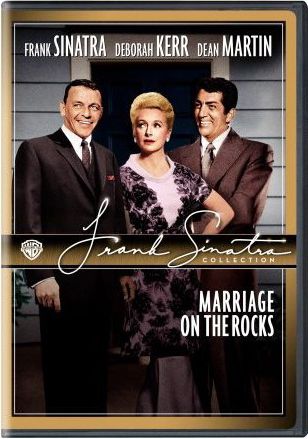
Marriage on the Rocks is a weak sex farce that lacks the spark of creative commitment. Sinatra and Dean Martin act as if the filming schedule was sandwiched into their jet-set schedule; only Deborah Kerr seems to be paying full attention. Perhaps there's some tired Rat Pack appeal here, but the show is too grim to be funny and too lame to be camp.
Busy ad man Dan Edwards (Sinatra) ignores his wife Val (Deborah Kerr) while playboy executive Ernie (Dean Martin) 'auditions' a succession of sexy secretaries at his beach house. Lawyer John McGiver talks Val out of a divorce, and she and Dan fly to Mexico to rekindle their marriage. Tourist trap justice of the peace Cesar Romero mistakenly divorces the couple, and in another witless mix-up Val ends up married to Ernie. This turnabout gives Sinatra a chance to be the playboy while Martin crumbles under the responsibilities of business and family, etc. It's basically the central situation of The Tender Trap, rewritten by a chimpanzee.
Considering the talent employed, Marriage on the Rocks is a real waste. Almost nothing is funny, starting with the insulting image of Mexico as a quaint fleapit waiting to fleece lovesick Yankees. The bikini babes parading in and out of Dino's beach pad are as sexy as plastic blow-up dolls: Joi Lansing, Darlene Lucht, Sigrid Valdis. Hermione Baddeley is a 'kooky' mother-in-law. Nancy Sinatra and Tony Bill are meant to be comic exaggerations of young adults but come off as grotesque. The 'friends of Frank' casting enlists Trini Lopez to sing at a (yawn) wild Sunset Blvd. disco. It's more than just a case of material becoming dated; this is the offensively vapid kind of movie that made the Hollywood youth revolution inevitable.
Deborah Kerr began to have difficulty finding worthy roles around this time, and she acquits herself well under the sub-sitcom circumstances. After the fans of Marriage on the Rocks finish burning this reviewer at the stake, they'll be pleased by Warner Home Video's nearly perfect DVD presentation. A trailer is included. Nobody was brave enough to attempt laudatory featurettes for this film or None But the Brave.
On a scale of Excellent, Good, Fair, and Poor,
Frank Sinatra: The Golden Years rates:
Movies: Trap, Arm, Some: Excellent; Brave, Marriage: Fair
Video: All Excellent
Sound: All Excellent
Supplements: Featurettes and trailers (not on all titles)
Packaging: Keep case
Reviewed: May 8, 2008
Reviews on the Savant main site have additional credits information and are more likely to be updated and annotated with reader input and graphics.
Review Staff | About DVD Talk | Newsletter Subscribe | Join DVD Talk Forum
Copyright © MH Sub I, LLC dba Internet Brands. | Privacy Policy | Terms of Use
Subscribe to DVDTalk's Newsletters
|
| Release List | Reviews | Price Search | Shop | SUBSCRIBE | Forum | DVD Giveaways | Blu-Ray/ HD DVD | Advertise |





